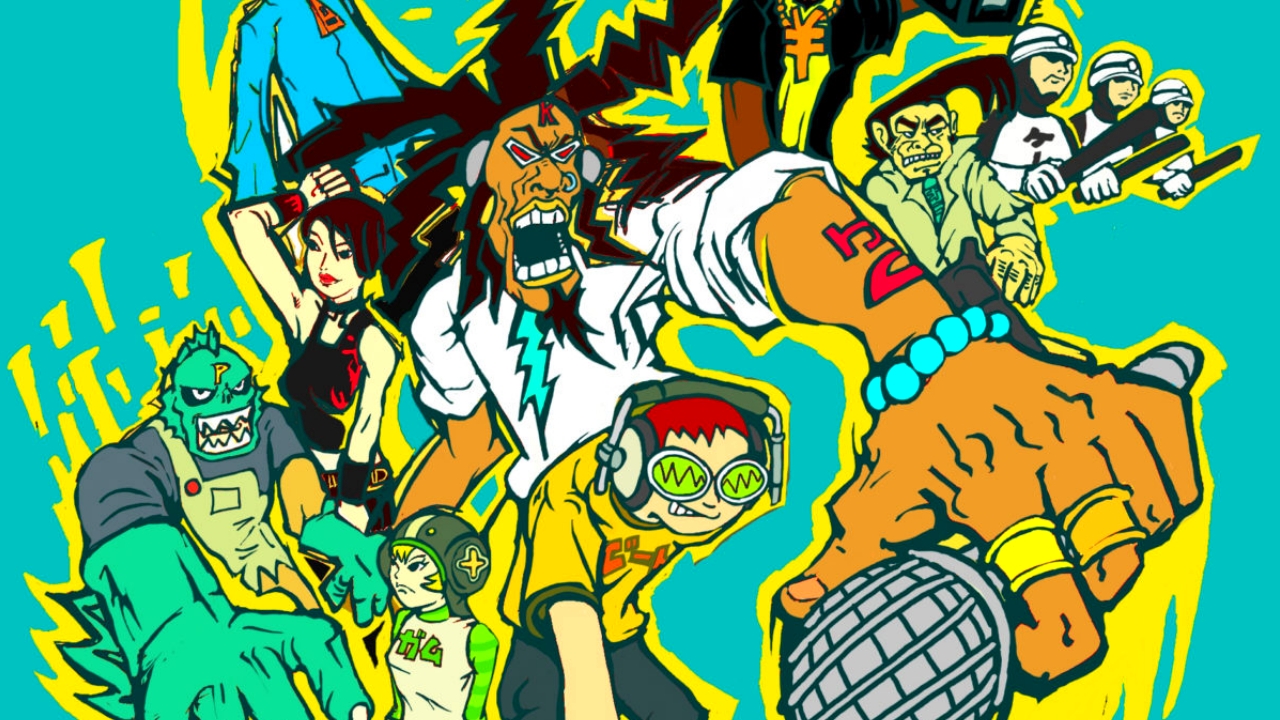I was thinking about music to add to the Spotify playlist and the soundtrack for the game Jet Set Radio came to mind. As video games and video game history are topics close to my heart, I wanted to make a post explaining why I think its an interesting example of Afro-Asian encounters! Jet Set Radio is a video game developed in Japan by a team of young developers at Sega in the late 90s. The game is a cult classic from the era, largely due to its lasting evocative style and exciting counter-culture tone. In the game, players skate around the fictionalized near future city of Tokyo-to, graffitiing buildings and avoiding the oppressive forces of the cities authoritarian corporate regime, all to an electric soundtrack that blends hip-hop, trip-hop, j-pop, and funk.
As Caty McCarthy catalogues in “20 Years Later, The Rowdy Creators of Tokyo-to Reflect on Making Jet Set Radio”, the young team (an average age of less than 25) had been given free reign by Sega to create something new and inventive. They started from a character design – a figure in skates wearing big clunky headphones, and quickly landed on the anti-establishment tone that would be core to the game. According to McCarthy’s interview, the world was built collaboratively by the team long before they knew what the mechanics themselves would be.
The influence of Black street culture on that world is undeniable – from the core message to the graffiti art to the dance animations to the sample filled soundtrack. The music itself is diegetic: broadcast within Tokyo-to from a pirate radio station by the Black DJ and narrator for the game DJ Professor K. As Frantz Jerome writes in “#NeverForget: ‘Jet Set Radio Future’ Flawlessly Paid Homage to Hip-Hop”, “The plot of JSRF was profound as hell: a giant corporation taking over Tokyo and silencing hip-hop culture! Kicking poor people out of their neighborhoods and over-policing them? Sounds like a dystopian Brooklyn circa 2009″
In the context of the late 90s, street culture from New York City seemed to represent to these developers a familiar anti-establishment counter-culture. Its youthful rebellion seemed just as salient a reference for the team as the closer to home Shibuya youth culture. The game thus becomes an encapsulation of trans-national solidarities; a bringing together of Shibuya and Brooklyn around shared values of youth resistance. The result is a unique and lasting classic in video game canon.

Works Cited
Jerome, Frantz. “#NeverForget: ‘Jet Set Radio Future’ Flawlessly Paid Homage to Hip-Hop.” Black Nerd Problems, 7 Mar. 2018, blacknerdproblems.com/jet-set-radio-and-hip-hop/.
Joseph, Funké. “Jet Set Radio Is an Anti-Cop, Y2K Fashion Dream.” i-D, 13 July 2020, i-d.vice.com/en_uk/article/z3ezjy/jet-set-radio-2000-anti-cop-graffiti-video-game.
McCarthy, Caty. “20 Years Later, The Rowdy Creators of Tokyo-to Reflect on Making Jet Set Radio.” USgamer.net, USgamer, 29 June 2020, www.usgamer.net/articles/jet-set-radio-20-year-anniversary-sega-feature-interview.
I really enjoyed reading this post! I think there is a connection to be made between black culture and counter culture because if we really think about it, black culture was considered and still to this day a counter culture. To exist in a space that does not cater or serve you is something that is so inherently black yet it produces some of the most amazing and beautiful stories ever made!